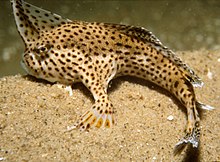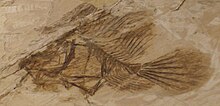Handfish
| Handfish | |
|---|---|

| |
| Brachionichthys hirsutus | |
| Scientific classification | |
| Domain: | Eukaryota |
| Kingdom: | Animalia |
| Phylum: | Chordata |
| Class: | Actinopterygii |
| Order: | Lophiiformes |
| Suborder: | Antennarioidei |
| Family: | Brachionichthyidae T. N. Gill, 1878 |
| Genera | |
|
Brachionichthys | |
Handfish are any anglerfish within the family Brachionichthyidae, a group which comprises five genera and 14 extant species.[2] These benthic marine fish are unusual in the way they propel themselves by walking on the sea floor rather than swimming.
Distribution
Handfish are found today in the coastal waters of southern and eastern Australia and Tasmania. This is the most species-rich of the few marine fish families endemic to the Australian region.
The biology of handfishes is poorly known and their typically small population sizes and restricted distributions make them highly vulnerable to disturbance. Some species are considered to be critically endangered.[3]
Anatomy
Handfish grow up to 15 cm (5.9 in) long, and have skin covered with denticles (tooth-like scales), giving them the alternate name warty anglers. They are slow-moving fish that prefer to 'walk' rather than swim, using their modified pectoral fins to move about on the sea floor. These highly modified fins have the appearance of hands, hence their scientific name, from Latin bracchium meaning "arm" and Greek ichthys meaning "fish".
Like other anglerfish, they possess an illicium, a modified dorsal fin ray above the mouth, but it is short and does not appear to be used as a fishing lure.[dubious – discuss][1] The second dorsal spine is joined to the third by a flap of skin, making a crest.[4]
Gallery
-
Spotted handfish, Brachionichthys hirsutus
-
Red handfish, Thymichthys politus
-
Warty handfish, Thymichthys verrucosus
Fossil record

The prehistoric species, Histionotophorus bassani, from the Lutetian of Monte Bolca, is now considered to be a handfish, sometimes even being included in the genus Brachionichthys. Considering the low extant diversity, restricted geographical distribution, and very meager fossil record of antennarioids in general, the existence of fossil representatives of the family Brachionichthyidae is unusual.[3]
Extinction
In March 2020, the smooth handfish (Sympterichthys unipennis) was declared extinct in the IUCN Red List.[5][6] Once common enough to be one of the first fish to be described by European explorers of Australia, but not seen for well over a century, this is the first modern-day marine fish to be officially declared extinct.[6]
In 1996, the spotted handfish (Brachionichthys hirsutus) was the first marine fish to be listed as critically endangered in the IUCN Red List.[6][7]
References
- ^ Sepkoski, Jack (2002). "A compendium of fossil marine animal genera". Bulletins of American Paleontology. 364: 560. Archived from the original on April 30, 2008.
- ^ Last, P.R.; Gledhill, D.C. (2009). "A revision of the Australian handfishes (Lophiiformes: Brachionichthyidae), with descriptions of three new genera and nine new species" (PDF). Zootaxa. 2252: 1–77. doi:10.11646/zootaxa.2252.1.1.
- ^ a b Carnevale, Giorgio; Pietsch, Theodore W. (2010). "Eocene handfishes from Monte Bolca, with description of a new genus and species, and a phylogeny of the family Brachionichthyidae (Teleostei: Lophiiformes)". Zoological Journal of the Linnean Society. 160 (4): 621–647. doi:10.1111/j.1096-3642.2009.00623.x.
- ^ Pietsch, Theodore W. (2005). "Brachionichthyidae". Tree of Life web project. Retrieved 4 April 2006.
- ^ Last, P.R., Edgar, G. & Stuart-Smith, R. (2020). Sympterichthys unipennis. The IUCN Red List of Threatened Species. doi:10.2305/IUCN.UK.2020-1.RLTS.T123423283A123424374.en
- ^ a b c Shiffman, David (July 2020). "Smooth Handfish Extinction Marks a Sad Milestone". Scientific American. 323 (1): 14.
- ^ Edgar, G., Stuart-Smith, R. & Last, P.R. (2020). Brachionichthys hirsutus. The IUCN Red List of Threatened Species. doi:10.2305/IUCN.UK.2020-1.RLTS.T2958A121210485.en



